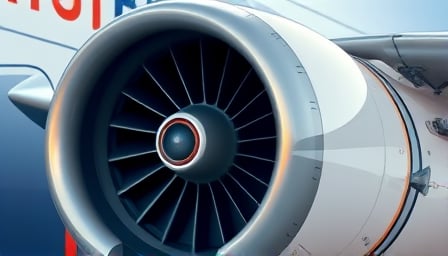Corporate Update – MTU Aero Engines AG
Share Performance in a Volatile Market
MTU Aero Engines AG (MTU), the German specialist in aerospace propulsion, has experienced modest intraday volatility in its shares over the past week. While the broader DAX index oscillated between small gains and losses, MTU’s price trajectory remained comparatively steady. Analysts attribute this relative resilience to the company’s entrenched position within the defense and commercial aviation sectors and to its robust long‑term contract portfolio.
Historical return data suggest that investors who entered the market around the 2013–2014 period would have earned a compounded annual growth rate in excess of 12 % during the subsequent decade. This long‑term upside is often cited by market participants when assessing the stability of MTU’s equity valuation in the face of short‑term market swings.
Leadership Transition at MTU Maintenance
In a strategic move aimed at reinforcing operational leadership, MTU Maintenance (a wholly‑owned subsidiary responsible for overhaul, repair, and modification services) has announced the appointment of Frank Haberkamp as its new managing director. Haberkamp succeeds Rainer Becker, who will retire from his role in Serbia. The transition is expected to inject fresh expertise into the maintenance arm, potentially improving efficiency, expanding service offerings, and strengthening client relationships—particularly in the high‑value aftermarket for military aircraft.
The leadership change comes at a time when the aerospace and defense industry is navigating increased regulatory scrutiny and a shifting geopolitical landscape. By positioning a seasoned executive at the helm of its maintenance operations, MTU signals its commitment to maintaining a competitive edge in both product development and aftermarket services.
Macro‑Economic and Geopolitical Context
The European market has been shaped by several macro‑economic pressures:
- Geopolitical Tensions – Ongoing conflicts in Eastern Europe and the Middle East have elevated demand for defense equipment, yet also raised uncertainty about long‑term procurement budgets.
- H‑1B Visa Regime Reforms – Adjustments to the U.S. immigration policy for skilled workers have implications for talent acquisition across the defense sector, potentially influencing the supply of high‑skill labor in aerospace engineering.
- Auto Industry Profit Warnings – Several major European automakers have issued cautionary profit forecasts, reflecting broader supply‑chain constraints and a slowdown in discretionary spending.
Against this backdrop, data indicating an acceleration in Germany’s private‑sector activity and robust growth in Eurozone service sector output provide a counterbalance, reinforcing investor confidence in industrial and aerospace firms. MTU’s sustained performance amid this environment underscores its capacity to leverage core competencies and secure long‑term contracts.
Strategic Implications for MTU Aero Engines
MTU operates at the intersection of advanced propulsion technology and geopolitical demand. Its business model rests on three pillars:
- Engine Development & Manufacturing – Continuous R&D investment to improve fuel efficiency, emissions, and digital integration.
- Aftermarket & Maintenance Services – A significant revenue stream derived from long‑term support contracts.
- Strategic Partnerships – Joint ventures and collaborations with global aerospace OEMs and defense contractors.
The appointment of Frank Haberkamp at MTU Maintenance dovetails with these pillars, potentially enhancing the aftermarket’s value proposition. Coupled with stable share performance, these developments suggest that MTU is proactively adapting to evolving market conditions while preserving its competitive stance.
Conclusion
In sum, MTU Aero Engines AG remains a resilient player in a sector marked by both high volatility and structural demand. Its share price, while sensitive to broader market movements, reflects underlying business fundamentals that have historically delivered solid returns. The recent leadership transition at MTU Maintenance signals an organizational commitment to operational excellence and market responsiveness, positioning the company to navigate the complex intersection of technological innovation, geopolitical dynamics, and economic cycles.
